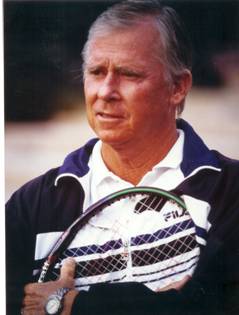By Charles Bricker
On the first weekend after the conclusion of the 2010 US Open, the United States will play what looks on the blueprint like a gimme Davis Cup tie against Colombia, but which, upon closer inspection, will be among the greatest challenges Patrick McEnroe has had to face in his nine-year tenure as team captain.
The pressure points: (a) playing at 10,000 feet of altitude; (b) playing on red clay, the United States’ worst surface; (c) playing against 8,000 horn-blowing, cat-calling, drum-banging fans in Bogota; and (d) the prospect, if the U.S. loses, of falling out of the 16-nation World Group for the first time since 1988.
Former Davis Cup captain Dennis Ralston, now living in Palm Springs, Calif., will tell you that none of these four points should be minimized, and he knows from personal experience. Ralston was in Bogota in mid-January of 1974, watching a pretty solid U.S. team get whacked 4-1 by the Colombians.
That one was played at a country club, where most of the Colombian supporters gave wide respect to both teams. But the altitude? “You’d better be prepared,” said Ralston. “No way you’re going to just walk into 10,000 feet and try to play. You’re going to feel it.

“If I was captain for this tie coming up, I’d be worried because, number one, anything can happen in Davis Cup. And then you’re playing in South America, where the crowd can be beyond what the average fan in the U.S. can even comprehend.”
Still, added Ralston, “I think our guys (John Isner, Sam Querrey and the Bryan brothers) have had enough experience. They were both there for that last one against Serbia, where we lost, and it didn’t look like they let the crowd bother them.”
Serbia is one thing. Colombia is another.
And Romania in 1972 might be a third, as Ralston recalled how linesmen in Bucharest conspired, and failed, to beat the U.S., in a bitter first-round match. We’ll get back to that Davis Cup road adventure in a moment, because what Ralston had to relate about that tie will curl your racket strings.
First, however, the Sept. 17-19 tie with Colombia, which the U.S. has to win to stay in the World Group.
In all likelihood, Colombia will send out current No. 58 Santiago Giraldo and No. 61 Alejandro Falla, the man who nearly shocked Roger Federer out in the first round at this year’s Wimbledon. They’ll be playing on clay, but Giraldo is only 10-13 on diret, Falla just 18-14.
Still, they’ve got home-court advantage, and this won’t be played at a country club, but at the Plaza de Toros Santamaria, where the U.S. should expect, shall we say, a degree of nationalistic pride that will be measured in decibels.
Vuvuzela horns blaring between points? Maybe even during points? You wouldn’t bet against that, would you? Or any other noise-producing device in an effort to unnerve, disrupt or distract the U.S. players.
Ralston took his players to Bogota eight days before the tie began in order to get used to the altitude and to hold some challenge matches among his players — Harold Solomon, Eddie Dibbs, Erik van Dillen and Charlie Pasarell.
Solomon and Dibbs were top-20 players still early in their careers and both exceptional on clay, so even in tough surroundings, the U.S. was favored to win. But Solomon lost both his matches and Dibbs seemed so affected by the altitude in the challenge matches that Ralston decided to play van Dillen instead in the second singles. The three days turned out to be a 10,000-foot high disaster.
And now, Romania, where two years later Ralston was in for another adventure. Ilie Nastase and Ion Tiriac were waiting to play a tie that Ralston believes should go down among the darkest moments in Davis Cup history.
All the linesmen and the chair umpire were Romanian, though the referee was the respected Argentine Enrique Morea. There were so many questionable calls that the U.S. was constantly calling Morea on court to deal with the suspicious line judging.
“On the last day, Morea came up to me and said, ‘Dennis, I’m not going to change any calls today. I can’t go out there anymore. I’ve got six bodyguards because I’ve changed so many calls. But I promise you this: If you lose, I’ll take Tiriac behind the locker room and beat his brains out.’
“I told him that doesn’t help me,” said Ralston. “But I guess he was in fear for his life and we had noticed that after the first day he did have six bodyguards.
“Five years later, a guy who defected from Romania came up to Stan Smith while we were at Forest Hills. He had been a linesman at that tie and he told Stan about a meeting the linesmen had at 9 a.m. to go over their signals as to how they would cheat us.”
Happily, we’ve progressed beyond that point and you don’t have doubts about the objectivity of refereeing at Davis Cup matches in this era. But they haven’t mandated that all matches be played at sea level or that fans not direct rude remarks to the visiting opponents — a couple of things that make Cup ties so challenging.
Charles Bricker can be reached at nflwriterr@aol.com. He is an alumni of the University of California at Berkeley and has had 41 distinguished years in the news business, covering 25 NFL seasons and Super Bowls and for the last 16 years, he has covered men’s and women’s professional tennis. Listen to Charlie every Monday at 7 pm – and on podcast – on World Tennis talk at http://primesportsnetwork.com/tennis.html
